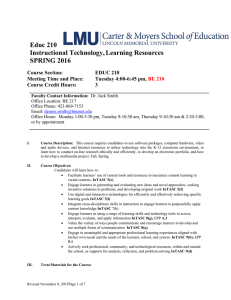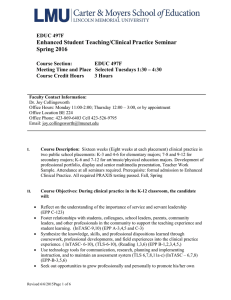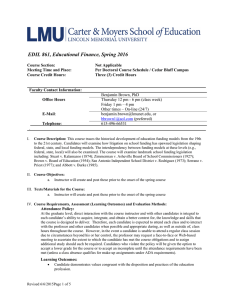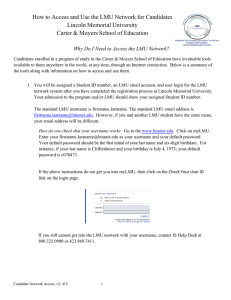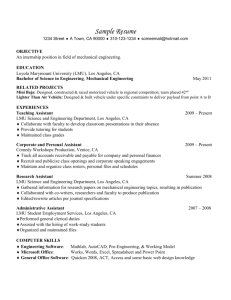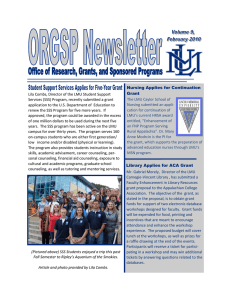EDUC 692 –K1 Diversity and Equity Issues Spring 2014
advertisement
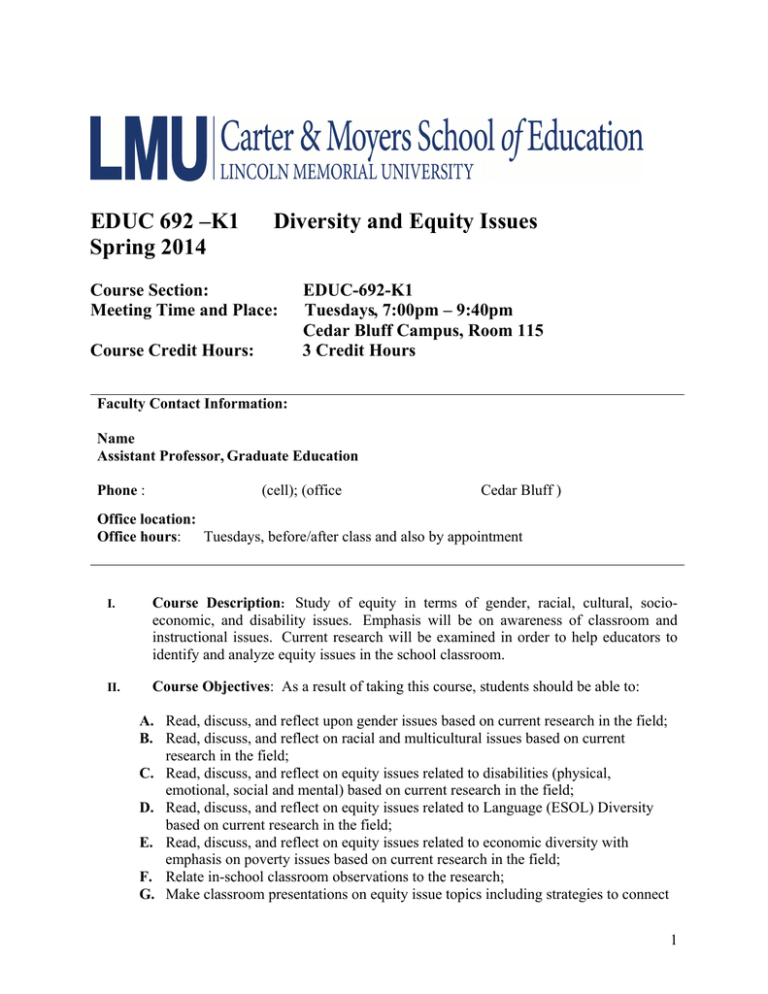
EDUC 692 –K1 Spring 2014 Diversity and Equity Issues Course Section: Meeting Time and Place: Course Credit Hours: EDUC-692-K1 Tuesdays, 7:00pm – 9:40pm Cedar Bluff Campus, Room 115 3 Credit Hours Faculty Contact Information: Name Assistant Professor, Graduate Education Phone : (cell); (office Cedar Bluff ) Office location: Office hours: Tuesdays, before/after class and also by appointment I. Course Description: Study of equity in terms of gender, racial, cultural, socioeconomic, and disability issues. Emphasis will be on awareness of classroom and instructional issues. Current research will be examined in order to help educators to identify and analyze equity issues in the school classroom. II. Course Objectives: As a result of taking this course, students should be able to: A. Read, discuss, and reflect upon gender issues based on current research in the field; B. Read, discuss, and reflect on racial and multicultural issues based on current research in the field; C. Read, discuss, and reflect on equity issues related to disabilities (physical, emotional, social and mental) based on current research in the field; D. Read, discuss, and reflect on equity issues related to Language (ESOL) Diversity based on current research in the field; E. Read, discuss, and reflect on equity issues related to economic diversity with emphasis on poverty issues based on current research in the field; F. Relate in-school classroom observations to the research; G. Make classroom presentations on equity issue topics including strategies to connect 1 teachers, students and standards to provide success for diverse learners; H. Consider teaching strategies to advance success for diverse learners in inclusive classrooms; Standards/Goals: This course will prepare educators as leaders with professional skills and competencies to be able to communicate ethical beliefs about life in general and education in particular in a risk-free environment and collaborative community. It will provide students with an in-depth familiarity with current research regarding inequities related to the classroom. Students will participate in class activities designed to help them and identify and correct some of these inequities. Students should be able to implement appropriate research-based changes in their pedagogies to combat these inequities. III. Texts/Materials for the Course: Required Text: Spradlin, L.K. (2012). Diversity matters: Understanding diversity in schools (2nd ed.). Upper Saddle River, NJ: Cengage. College LiveText© NOTE: DO NOT purchase “used” LiveText materials. This will not allow you to submit assignments under your name. Turnitin© Blackboard© Recommended Text: American Psychological Association. (2001). Publication Manual of the American J Psychological Association (6th ed.). Washington, DC: Author IV. Course Requirements, ASSESSMENT (Learning Outcomes) & Evaluation Methods: Each student will be required to: A. Attendance: Attend all class meetings; absences as well as tardiness will be reflected in assessment. In case of emergencies, students should endeavor to contact instructor before missing a class. Make-up work for in-class activities may be accepted but must be of exceptional quality in order to receive credit. Grades for work that is turned in late will be penalized. Live Text submissions will be required. Late submissions will be penalized. There is no way to make- up for missing class discussions. B. Course Requirements: The candidate will: complete all assigned readings and participate in class discussions; complete in-class activities/applications drawn from class topics; demonstrate the correct use of Standard English with regards to grammar, 2 punctuation, spelling and proper mechanics in all written work; participate in constructivist activities related to their content; complete and submit all assignments by specified deadlines C. Assessment/Learning Outcomes/Evaluation: 1. Complete one unit of study. 2. Write a five page research paper on a specific topic given by instructor. 3. Complete and present a group research project on a classroom diversity or multicultural issue. 4. Design and submit an educational technology activity (Assistive Technologies). 5. Critique, reflect, and present two articles from a professional journal addressing a current issue in the discipline; guidelines will be provided. 6. Complete an online mid-term and final examination. 7. Complete specific course assignments as required by the instructor. ASSESSMENTS VALUE Technology in the Classroom Activity 10 Points Article Critique and Reflections 10 Points Mid-term Exam 10 Points Final Exam 10 Points Group Project 15 Points Research Paper 15 Points Diversity and Multicultural Unit Plan 30 Points Total 100 Points GRADING SCALE 93-100 A 90-92 A87-89 B+ 80-86 B V. Methods of Instruction: 3 Lecture, group discussion, small group teaching and assessment, collaboration, observation and analysis, demonstration, independent research, activities and/or performance tasks, cooperative learning, demonstration/presentation of projects, inquiry learning, use of technology, and professional developments. Active participation and learning through dialogue is strongly encouraged in this Masters level course. It is expected that the students will share the responsibility for others and their own learning. VI. Information Literacy/Technological Resources: Technology Incoming students must be computer literate, able to use software for e-mail, word processing, web browsing, and information retrieval. Students must have access to the Internet for communicating with instructors and accessing learning resources. Computer access must be available on a personal computer. All program e-mail correspondence must be done using the LMU e-mail system through Pathway. LiveText Each student will be required to establish an account with the LiveText program by the second class session. LiveText is a web-based application offering a comprehensive suite of development, management, and assessment tools. This suite of tools provides colleges and universities with the capability to assess student work online using assessment instruments that have been developed and implemented by the individual college faculty and/or departments. Specific instructions will be distributed on a separate handout at your first class session. LiveText may be purchased online at http://college.livetext.com or through the LMU Bookstore. LiveText Help is available on the Graduate Office web page – see the web page address on the previous page. Library Resources The Carnegie-Vincent Library provides access to three outstanding databases in the Education field: ERIC, the Educational Resource Information Center, the premier database for education related journal articles and documents containing over one million citations and links to more than 100,000 documents in full-text; Professional Collection, a custom selection of more than 300 full text periodicals for educators covering the subject areas of “health and fitness, school law, drug and alcohol abuse, learning disabilities, sports, arts and humanities, social sciences, and psychology”; and ProQuest Education Journals database which contains access to 760 leading journals of which over 600 are in full-text. Additionally, the library provides access to over 100 other databases and can obtain books and articles from libraries worldwide through Interlibrary Loan. VII. University Policies: Students With Disabilities Policy: As a rule, all students must read and comply with standards of the LMU Student Handbook and LMU catalogue. Any student seeking assistance in accordance with the Americans Disabilities Act (1990 as amended) should contact the ADA Coordinator, Dan Graves, with regard to required documentation and in order to make appropriate arrangements. Contact information: dan.graves@lmunet.edu 4 and/or 423.869.6267 (800-325-0900 ext. 6267). Counseling: LMU counselors are available to help current students with personal, career and academic concerns that affect academic success and quality of life. The Director of Counseling, Jason Kishpaugh, can be contacted at jason.kishpaugh@lmunet.edu and/or 423.869.6401 (800-325-0900 ext. 6401). Discrimination, Scholastic Dishonesty, Cheating, and Plagiarism Policies can be found in the student handbook: LMU’s website: http://www.lmunet.edu/campuslife/handbooks.shtml. Course Evaluations: In addition to meeting degree requirements specified in the graduate and undergraduate catalogs, all students are required to complete University-administered course evaluations. Outcomes Assessment Testing: Degree requirements include participating in all outcomes assessment testing (e.g., general education assessment, major field tests, etc.) and activities when requested. Students may be required to complete one or more questionnaires and to take one or more standardized tests to determine general educational achievement as a prerequisite to graduation (see appropriate catalog for additional information). All Associate of Science – Nursing; Associate of Science – Veterinary Health Science; and Associate of Science – Veterinary Medical Technology students must take the General Education Proficiency Profile examination. LMU’s Inclement Weather Policy can be found at the following link to LMU’s website: http://www.lmunet.edu/curstudents/weather.shtml. Students should check their LMU email during delays/closures to receive information from individual faculty regarding potential assignments and/or other course information. *Unit Commitment to Diversity – The School of Education recognizes differences among groups of people and individuals based on ethnicity, race, socioeconomic status, gender, exceptionalities, language, religion, sexual orientation, and geographical area. The unit designs, implements, and evaluates curriculum and provides experiences for candidates to acquire and demonstrate the knowledge, skills, and professional dispositions necessary to help all students learn. Assessments indicate that candidates can demonstrate and apply proficiencies related to diversity. Experiences provided for candidates include working with diverse populations, including higher education and K-12 school faculty, candidates, and students in K-12 schools. Program Policies: Children, Cell Phones, Laptops and Professional Dress in the Classrooms •Children are not to be brought to class or left on the site unattended. •Cell phones are to be silenced at all times while classes are in session so as not to interrupt the flow of instruction and learning. •It is intended that laptops to be used for assignments only. The unnecessary use of laptops during discussion, lecture, or other classroom activities will be considered inappropriate. •Teacher candidates should appropriately and dress professionally for scheduled class meeting and school events. We apologize for any inconvenience this may cause but we must respect the rights of all our students to concentrate uninterrupted. Students who violate these policies may be 5 asked to leave. Service Learning/Professional Development: All candidates in the MEdITL Program will be required to participate in professional development and service learning projects that must be completed outside the regular schedule of classes. These professional development and service learning hours will be included as a portion of your required coursework and will be evaluated for completion and quality of participation. Faculty will provide specific guidelines for successful completion of these required hours. All service learning and professional development must be approved by the instructor. Smoke Free Campus Policy All LMU buildings are smoke - free. Smoking is prohibited in all campus buildings for health and safety reasons. Residence hall rooms contain sensitive smoke detectors, and consequently, smoking will trigger smoke detector alarms. Fines of up $250.00 may be imposed on any persons tampering with detectors. Smoking is allowed only outside of facilities. Alcohol and Drugs Students may not possess, consume, sell, use, or be in the presence of alcoholic beverages non-medically prescribed drugs on campus grounds, in university buildings, or at university activities. VIII. Mission statements: Lincoln Memorial University Mission Statement can be found at the following link to LMU’s website: http://www.lmunet.edu/about/mission.shtml. EPP Vision and Mission The Carter & Moyers School of Education prepares and mentors professional educators school of distinction through Values, Education, and Service to be teachers, administrators, leaders, or other school professionals whose practice will improve student learning. DEPARTMENT OF GRADUATE EDUCATION MISSION STATEMENT The mission of the Lincoln Memorial University Department of Graduate Education, as a student-sensitive entity, is to prepare professionals with knowledge, skills, competencies, and dispositions to meet the changing needs of society through relevant student-centered experiences. *M.ED. IN INITIAL TEACHER LICENSURE PROGRAM MISSION STATEMENT The M. Ed. for Initial Teacher Licensure Program supports the Lincoln Memorial Teacher Education Program’s mission and is dedicated to preparing quality practitioners who are highly effective in their teaching and learning as a result of abilities acquired through rigorous and diverse academic studies, and in collaboration with K-12 schools. This Program strives to develop teacher-leaders who inspire renewal, who are capable of meeting the challenges of an ever increasingly global society, and who possess an understanding of the moral, social, and political dimensions of education. 6 IX. Course Outline/Assignment/unit of instruction or Clinical Schedule: Date Topics/Activity Readings/Assignments Due This Week Jan 12 Jan 19 Jan 26 Feb 2 Feb 9 Feb 16 Feb 23 Mar 1 Mar 8 Mar 15 Mar 22 Spring Break Have a nice break! Mar 29 Apr 5 Apr 12 Apr 19 Apr 26 Final Examination Final Exam Note: Above schedule is TENTATIVE and may be adjusted based on student need. Due dates for major assignments will be announced in class. X. Disposition & Ethics: The National Council for Accreditation of Teacher Education (NCATE) Standard 1 requires that education professionals exhibit professional dispositions, defined as Professional attitudes, values, and beliefs demonstrated through both verbal and non-verbal behaviors as educators interact with students, families, colleagues, and communities. These positive behaviors support student learning and development. Candidates recommended from LMU for teacher licensure by the State of Tennessee 7 must exhibit professional dispositions in their interactions with all stakeholders, including classmates, P-12 administrators, cooperating teachers, students, and University faculty, staff and supervisors while in the University environment and in field placements. Reports of behavior, actions, or attitudes that are not considered professional or meeting the professional disposition requirements could result in termination from the MEd in Initial Teacher Licensure Program. Plagiarism/Certification of Authorship Plagiarism (This statement must be included with all major written assignments.) Plagiarism is the presentation of someone else’s words or ideas as one’s own (See APA Publication Manual, 6th ed., pp.15-16). One of the most common forms of plagiarism is the paraphrasing of several phrases, sentences of ideas in a paragraph with only one citation at the end of the paragraph, resulting in confusion between the cited content and the researcher’s own words or ideas. Another common form is the practice of substituting words or phrases while retaining the original author’s for and structure. Plagiarism in any form is one of the most egregious violations of professional ethics an author can commit. Submission of plagiarized material, even by accident or ignorance, is a severe infraction of the professional ethical code and can result in expulsion from the program. To avoid plagiarism: 179. Cite sources within the text for all phrases or ideas that are quoted or paraphrased. Cite sources within the text in the format delineated in the APA Manual, pp. 174- Certification of Authorship. I certify that I am the author of this paper titled ___________________ and that any assistance I received in its preparation is fully acknowledged and disclosed in the paper. I have also cited any sources from which I used data, ideas, or words, either quoted directly or paraphrased. I also certify that this paper was prepared by me specifically for this course. I understand that falsification of information will affect my status as a graduate student. Student’s Signature________________ Date ______________ Important Dates in the Academic Calendar Spring 2016: Final Registration before classes begin Classes begin (Regular term)* Martin Luther King Jr. Day (special activities) Last day to complete registration/add classes Last day to drop course without “WD” Lincoln Day/Founders Day (special January 8 January 11 January 18 January 20 February 9 February 12 8 activities) Convocation (9:30 a.m. in session classes & resident students) Mid-term Last day to drop course without “F” Early Registration Begins Residence halls close (5 p.m.) Spring break (no classes) Good Friday (no classes) Residence halls open (1 p.m.) Classes end Final exams Commencement (11 a.m.) Residence halls close (2 p.m.) February 17 February 29-March 4 March 19 April 4 March 18 March 21-25 March 25 March 27 April 29 May 2-6 May 7 May 7 *The first class session for EDUC 571 is Saturday, January 9, 2016. The last class session for EDUC 571 meets on Saturday, April 30, 2016. It is a mandatory class session. XI. STUDENT COMMUNITY ENGAGEMENT: A cornerstone of the University’s mission is service to humanity. As part of the University’s Student Service Initiative, students receiving any form of institutional aid participate in at least 10 hours of service learning per semester. Students are encouraged to network with one another in classroom settings and with instructors and advisors for searching out and creating appropriate service learning projects related to their field of study. For more information visit: http://www.lmunet.edu/campuslife/initiative/index.shtml or contact Larry Thacker, Associate Dean of Students. XII. THE INSTRUCTOR RESERVES THE RIGHT TO REVISE, ALTER AND/OR AMEND THIS SYLLABUS, AS NECESSARY. STUDENTS WILL BE NOTIFIED IN WRITING AND/OR BY EMAIL OF ANY SUCH REVISIONS, ALTERATIONS AND/OR AMENDMENTS. 9
